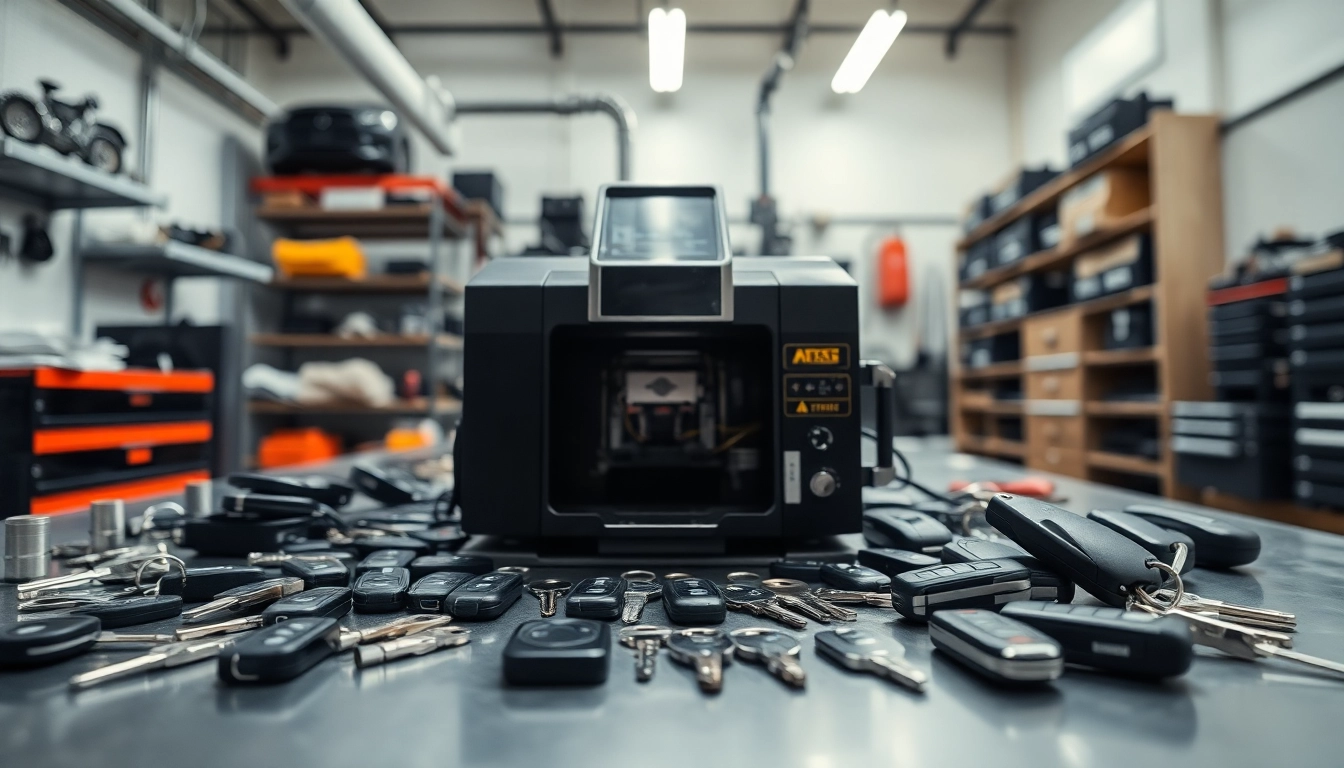Understanding Replacement Car Keys
In an era where convenience is paramount, car owners need to be well-informed about their options regarding Replacement Car Keys. Losing or damaging a car key can be more than just an inconvenience; it can affect your daily routine and, in some cases, even your safety. Understanding the intricacies of replacement car keys aids in making informed decisions that not only save time but also money.
Types of Replacement Car Keys
Replacement car keys come in various types, each designed with specific functionalities and technologies. Here are the primary categories:
- Traditional Keys: These are standard mechanical keys that operate with a physical lock. They are the most straightforward type of key, usually less expensive to replace, and can often be replicated at a locksmith or hardware store.
- Transponder Keys: These keys contain a chip that communicates with the car’s engine control unit (ECU), providing an added layer of security. If your transponder key is lost, you’ll need a professional service to reprogram a new key for your vehicle.
- Key Fobs: Key fobs operate wirelessly and often include features such as remote locking and unlocking, trunk release, and panic buttons. Their replacement generally requires special programming and can be more costly.
- Smart Keys: Found in high-end vehicles, smart keys allow for keyless entry and ignition. Replacement often involves complex programming and advanced technology, leading to higher costs.
How Replacement Car Keys Work
The functionality of replacement car keys heavily relies on their technology. Traditional keys use a physical cut to engage the lock, while modern keys—such as transponder keys, key fobs, and smart keys—utilize encryption and electronic signals. When a transponder key is used, for instance, it sends a unique code to the vehicle’s ECU, which then decides whether to grant access. Understanding this interplay is crucial, especially when it comes to replacement and reprogramming procedures.
Common Issues with Replacement Car Keys
While replacement car keys offer a solution to lost or damaged keys, several common issues can arise:
- Programming Failures: New keys often require programming that must be done accurately. If the key or fob isn’t programmed correctly, it will not function, necessitating further troubleshooting.
- Compatibility Problems: Not all keys or fobs will work with all vehicle models. It’s essential to ensure compatibility with your specific vehicle make and model.
- Cost Concerns: The price of replacement keys varies significantly based on type and technology. Understanding these costs upfront can help manage expectations.
- Availability: Some specialized keys may take longer to obtain, especially if they need to be ordered from the manufacturer.
Finding Reliable Services for Replacement Car Keys
Locating trustworthy services for obtaining replacement car keys is crucial to ensuring you receive quality and timely assistance. Here’s how to navigate this landscape:
Local vs. Online Services
Choosing between local locksmiths or online services can largely depend on convenience, cost, and urgency:
- Local Services: Locksmiths or automotive key specialists can often provide immediate assistance and can program keys on the spot, making them a suitable choice for those who require quick replacements.
- Online Services: Many websites offer the ability to order replacement keys or key fobs, sometimes at a lower cost than local locksmiths. However, you must consider the time for shipping and whether professional programming is available.
Evaluating Service Providers
When choosing a service provider, consider these key factors:
- Reviews and Reputation: Look for reviews from previous customers to gauge reliability and quality.
- Certifications: A certified locksmith or service provider is likely to understand the complexities of car key technology better.
- Warranty and Guarantees: Reputable services often provide warranties on their work, offering peace of mind.
Cost Considerations for Replacement Car Keys
Understanding the costs involved in obtaining replacement car keys can help you budget effectively:
- Types of Keys: Costs can range significantly based on whether you need a basic mechanical key or a more complex smart key.
- Service Fees: In addition to the cost of the key, service fees for programming or cutting may apply, especially for high-tech keys.
- Hidden Costs: Be aware of potential hidden costs, such as trip charges if the service provider comes to you.
Steps to Obtain Replacement Car Keys
Obtaining a replacement car key can be straightforward if you follow these systematic steps:
Gathering Necessary Information
Prior to contacting a service provider, gather pertinent information:
- Vehicle Identification Number (VIN): This number is essential for locating the correct key specifications for your car.
- Proof of Ownership: Be prepared to provide documentation that proves you own the vehicle, which can include registration or title.
- Key Details: Provide details about your existing key, including type and any known issues (if applicable).
Choosing the Right Method for Replacement
Consider which method suits your needs best:
- In-Person Visits: If time-sensitive, visiting a local locksmith or dealership may be the quickest route to a new key.
- Online Orders: For non-urgent replacements, ordering online could save money. Just be sure to follow up with programming instructions or options.
DIY vs. Professional Services for Replacement Car Keys
Deciding whether to pursue a DIY approach or hire a professional can depend on the complexity of the key:
- DIY Replacement: Some keys, especially traditional ones, can be easily duplicated at a hardware store using a key-cutting machine.
- Professional Replacement: For more complex keys like transponder or smart keys, it is often best to rely on professional services to ensure proper programming and functionality.
Best Practices for Maintaining Your Replacement Car Keys
Once you’ve replaced your car keys, taking care of them will extend their longevity and usability:
Care Tips for Electronic Keys
Proper care for electronic car keys can reduce the likelihood of damage and replacement:
- Avoid Water Exposure: Keep keys dry, as moisture can damage electronic components.
- Store Safely: Avoid putting keys on a keychain with heavy items that can cause wear and tear.
- Battery Replacement: Periodically check and replace the battery in digital keys to prevent malfunction.
Understanding Key Programming
Being informed about key programming ensures you don’t face unexpected issues post-replacement:
- Reprogramming after Replacement: If a new key is programmed to your vehicle, previous keys might need to be reprogrammed or disabled for security reasons.
- Authorized Programming: Ensuring programming is done by a certified professional prevents future access issues.
When to Replace Your Replacement Car Keys
Knowing when to replace your replacement car keys is essential for ongoing functionality:
- Key Malfunction: If you notice that unlocking or starting your vehicle is inconsistent, it may be time for a replacement.
- Physical Damage: If a key is cracked or weathered, consider replacing it to avoid getting locked out.
- Technological Changes: As vehicles evolve, keeping keys updated is vital for compatibility and security.
Future Trends in Replacement Car Keys
As technology evolves, so does the industry surrounding replacement car keys. Here are some trends to watch:
Advancements in Key Technology
The advancement of key technologies shows no signs of slowing down, with innovations enhancing security and user experience:
- Mobile App Integration: Key functionalities may soon be accessible directly from a smartphone, allowing users to unlock and start their vehicles with an app.
- Biometric Technology: Future keys could utilize biometric data like fingerprint recognition, providing enhanced security features.
- Improved Programming Tools: Tools that simplify the key programming process are becoming more widely available, minimizing the need for professional intervention.
Sustainability in Key Manufacturing
With an increasing focus on environmental sustainability, the key manufacturing sector is seeing innovative changes:
- Recyclable Materials: The use of eco-friendly materials in key production is a growing trend aimed at reducing environmental impact.
- Energy-Efficient Manufacturing: Sustainable practices in manufacturing processes are gaining traction within the industry.
Consumer Preferences Shaping the Future
As consumers become more aware of their options and preferences shape the market, key manufacturers are pivoting appropriately:
- Increased Demand for DIY Solutions: Consumers are showing interest in easier, do-it-yourself approaches to key cutting and programming.
- Personalization Features: As personalization becomes a broader trend, customizable keys may emerge that reflect individual tastes and styles.


